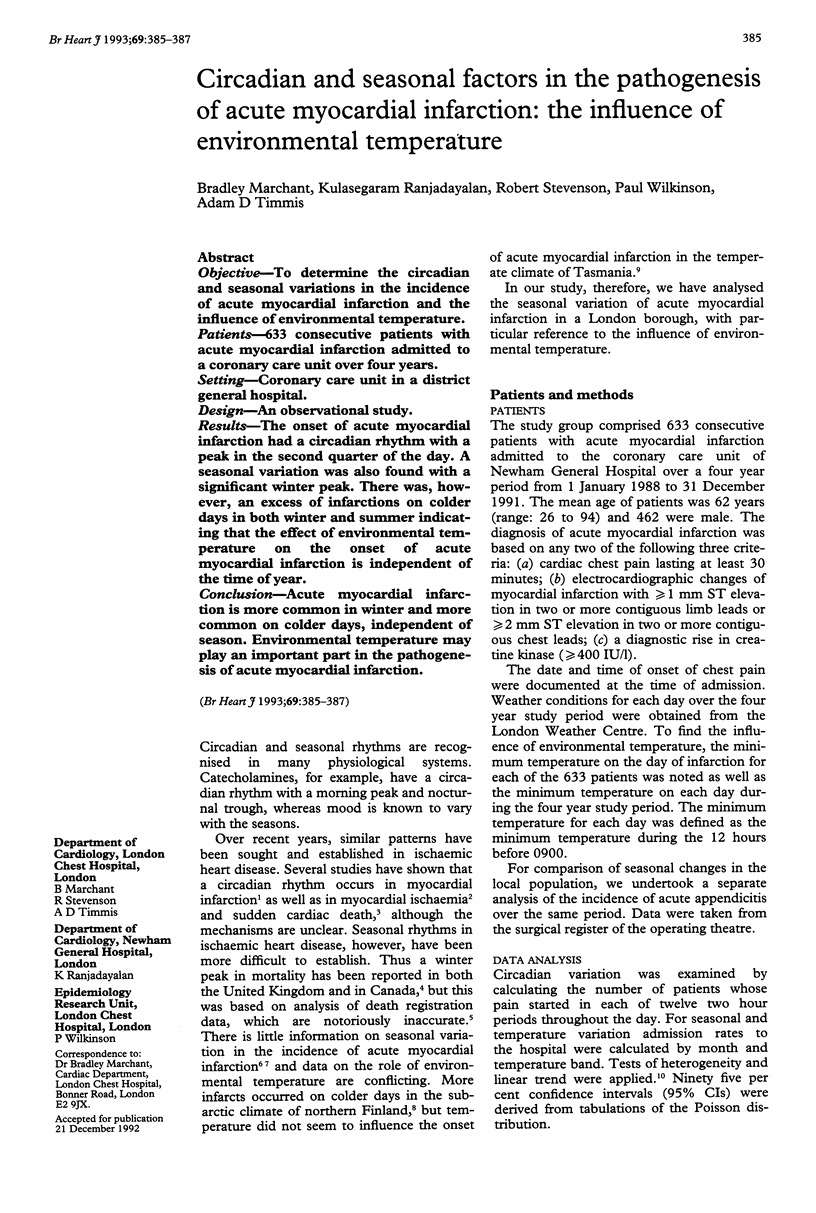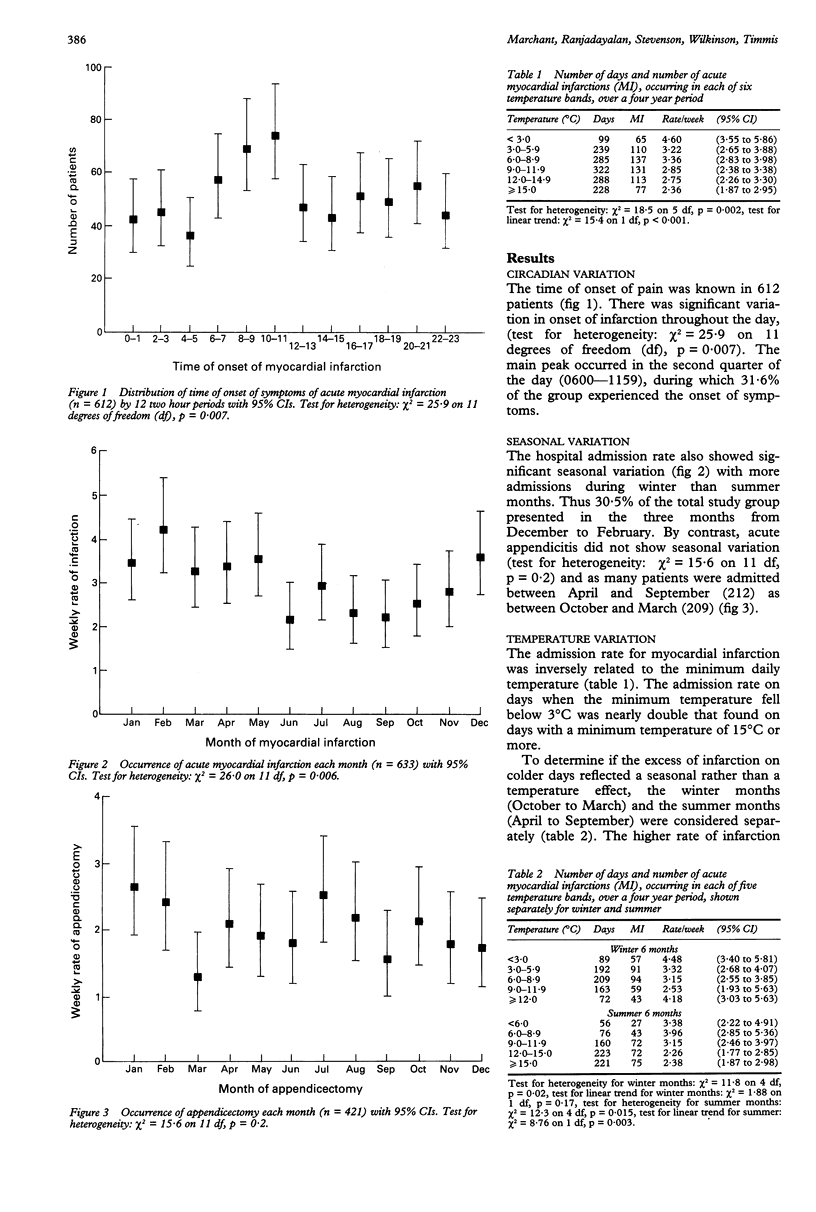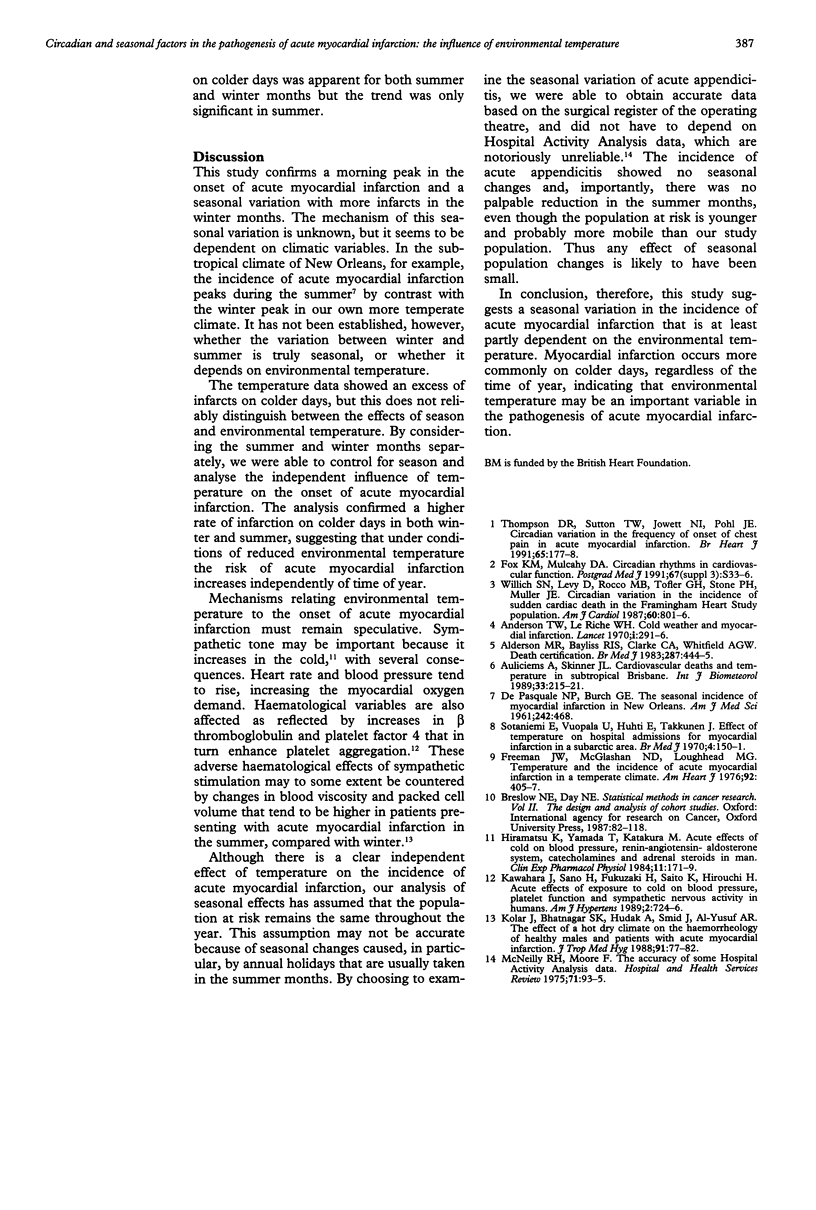Abstract
OBJECTIVE--To determine the circadian and seasonal variations in the incidence of acute myocardial infarction and the influence of environmental temperature. PATIENTS--633 consecutive patients with acute myocardial infarction admitted to a coronary care unit over four years. SETTING--Coronary care unit in a district general hospital. DESIGN--An observational study. RESULTS--The onset of acute myocardial infarction had a circadian rhythm with a peak in the second quarter of the day. A seasonal variation was also found with a significant winter peak. There was, however, an excess of infarctions on colder days in both winter and summer indicating that the effect of environmental temperature on the onset of acute myocardial infarction is independent of the time of year. CONCLUSION--Acute myocardial infarction is more common in winter and more common on colder days, independent of season. Environmental temperature may play an important part in the pathogenesis of acute myocardial infarction.
Full text
PDF


Selected References
These references are in PubMed. This may not be the complete list of references from this article.
- Alderson M. R., Bayliss R. I., Clarke C. A., Whitfield A. G. Death certification. Br Med J (Clin Res Ed) 1983 Aug 13;287(6390):444–445. doi: 10.1136/bmj.287.6390.444. [DOI] [PMC free article] [PubMed] [Google Scholar]
- Anderson T. W., Le Riche W. H. Cold weather and myocardial infarction. Lancet. 1970 Feb 7;1(7641):291–296. doi: 10.1016/s0140-6736(70)90651-3. [DOI] [PubMed] [Google Scholar]
- Auliciems A., Skinner J. L. Cardiovascular deaths and temperature in subtropical Brisbane. Int J Biometeorol. 1989 Dec;33(4):215–221. doi: 10.1007/BF01051080. [DOI] [PubMed] [Google Scholar]
- DEPASQUALE N. P., BURCH G. E. The seasonal incidence of myocardial infarction in New Orleans. Am J Med Sci. 1961 Oct;242:468–474. doi: 10.1097/00000441-196110000-00012. [DOI] [PubMed] [Google Scholar]
- Freeman J. W., McGlashan N. D., Loughhead M. G. Temperature and the incidence of acute myocardial infarction in a temperate climate. Am Heart J. 1976 Sep;92(3):405–407. doi: 10.1016/s0002-8703(76)80124-x. [DOI] [PubMed] [Google Scholar]
- Hiramatsu K., Yamada T., Katakura M. Acute effects of cold on blood pressure, renin-angiotensin-aldosterone system, catecholamines and adrenal steroids in man. Clin Exp Pharmacol Physiol. 1984 Mar-Apr;11(2):171–179. doi: 10.1111/j.1440-1681.1984.tb00254.x. [DOI] [PubMed] [Google Scholar]
- Hiramatsu K., Yamada T., Katakura M. Acute effects of cold on blood pressure, renin-angiotensin-aldosterone system, catecholamines and adrenal steroids in man. Clin Exp Pharmacol Physiol. 1984 Mar-Apr;11(2):171–179. doi: 10.1111/j.1440-1681.1984.tb00254.x. [DOI] [PubMed] [Google Scholar]
- Kawahara J., Sano H., Fukuzaki H., Saito K., Hirouchi H. Acute effects of exposure to cold on blood pressure, platelet function and sympathetic nervous activity in humans. Am J Hypertens. 1989 Sep;2(9):724–726. doi: 10.1093/ajh/2.9.724. [DOI] [PubMed] [Google Scholar]
- Kolar J., Bhatnagar S. K., Hudak A., Smid J., al-Yusuf A. R. The effect of a hot dry climate on the haemorrheology of healthy males and patients with acute myocardial infarction. J Trop Med Hyg. 1988 Apr;91(2):77–82. [PubMed] [Google Scholar]
- Sotaniemi E., Vuopala U., Huhti E., Takkunen J. Efeect of temperature on hospital admissions for myocardial infarction in a subarctic area. Br Med J. 1970 Oct 17;4(5728):150–151. doi: 10.1136/bmj.4.5728.150. [DOI] [PMC free article] [PubMed] [Google Scholar]
- Thompson D. R., Sutton T. W., Jowett N. I., Pohl J. E. Circadian variation in the frequency of onset of chest pain in acute myocardial infarction. Br Heart J. 1991 Apr;65(4):177–178. doi: 10.1136/hrt.65.4.177. [DOI] [PMC free article] [PubMed] [Google Scholar]
- Willich S. N., Levy D., Rocco M. B., Tofler G. H., Stone P. H., Muller J. E. Circadian variation in the incidence of sudden cardiac death in the Framingham Heart Study population. Am J Cardiol. 1987 Oct 1;60(10):801–806. doi: 10.1016/0002-9149(87)91027-7. [DOI] [PubMed] [Google Scholar]


